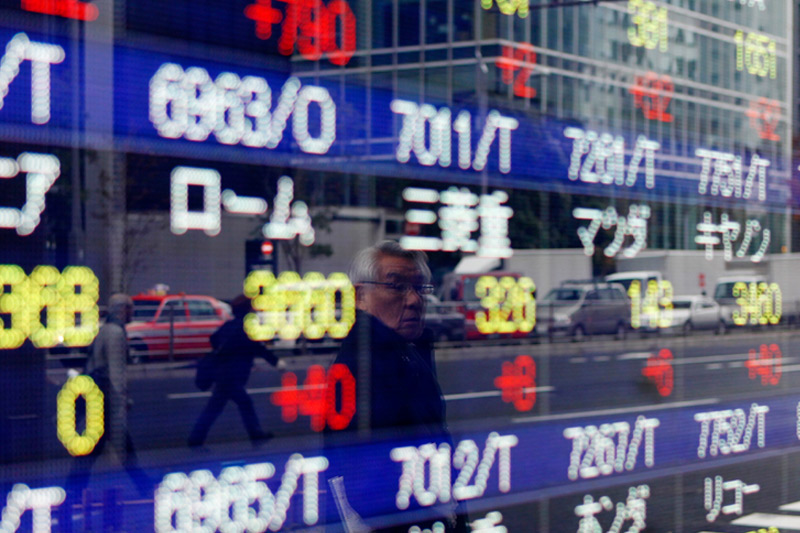Investing.com - Asian stock markets were mixed during late Asian trade on Tuesday, with markets in Japan coming under pressure as the yen strengthened against its major counterparts ahead of the Bank of Japan’s highly-anticipated policy meeting later this week.
During late Asian trade, Hong Kong's Hang Seng Index dipped 0.1%, Australia’s ASX/200 Index ended up 0.4%, while Japan’s Nikkei 225 Index declined 1%.
In Tokyo, the Nikkei fell sharply earlier in the session, losing 2.7% at one point, as the yen advanced against the U.S. dollar, weighing on exporters.
A stronger yen reduces the value of overseas income at Japanese companies when repatriated, dampening the outlook for export earnings.
Nikon and Canon saw shares fall 3.2% and 3.4% respectively, while automakers Honda and Toyota dropped 2.6% and 3%.
On the upside, Japanese megabanks were higher, with stocks of the nation’s largest lender Mitsubishi UFJ Financial Group rising 2.3%, while Sumitomo Mitsui Financial Group and Mizuho Financial Group jumped 1.7% and 1.6% respectively.
Meanwhile, in Hong Kong, the Hang Seng swung between modest gains and losses in choppy trade, as investors returned to the market after two days of closure for the Easter holiday.
Shares in the financial sector were lower, as investors continued to sell stocks in major lenders following last week's news that Chinese regulators will tighten their control on lending.
China’s largest lender Industrial and Commercial Bank of China saw shares lose 2.2%, while Bank of China declined 1.7%.
Elsewhere, in Australia, the benchmark ASX/200 Index inched higher after the Reserve Bank of Australia kept its benchmark interest rate unchanged at a record low in April.
In a statement released earlier, the RBA said it was leaving its benchmark interest rate unchanged at 3%, in line with expectations.
In its accompanying rate statement, RBA Governor Glenn Stevens said, “labor costs remain contained and businesses are focusing on lifting efficiency. These trends should help to keep inflation low, even as the effects on prices of the earlier exchange rate appreciation wane."
The big four banks all rose, with Australia's top lender, the Commonwealth Bank of Australia gaining 0.7%, while Westpac Banking Group and ANZ Banking Group added 0.6% apiece.
Looking ahead, European stock market futures pointed to a mixed open, after disappointing U.S. manufacturing data on Monday raised concerns over the strength of the U.S. economic recovery.
The EURO STOXX 50 futures pointed to a loss of 0.4% at the open, France’s CAC 40 futures added 0.1%, London’s FTSE 100 futures dipped 0.1%, while Germany's DAX futures pointed to a flat open.
Spain and Italy were to release data on manufacturing activity later in the day, while the euro zone was to produce official data on the unemployment rate across the currency bloc.
The U.S. was to release a government report on factory orders.
During late Asian trade, Hong Kong's Hang Seng Index dipped 0.1%, Australia’s ASX/200 Index ended up 0.4%, while Japan’s Nikkei 225 Index declined 1%.
In Tokyo, the Nikkei fell sharply earlier in the session, losing 2.7% at one point, as the yen advanced against the U.S. dollar, weighing on exporters.
A stronger yen reduces the value of overseas income at Japanese companies when repatriated, dampening the outlook for export earnings.
Nikon and Canon saw shares fall 3.2% and 3.4% respectively, while automakers Honda and Toyota dropped 2.6% and 3%.
On the upside, Japanese megabanks were higher, with stocks of the nation’s largest lender Mitsubishi UFJ Financial Group rising 2.3%, while Sumitomo Mitsui Financial Group and Mizuho Financial Group jumped 1.7% and 1.6% respectively.
Meanwhile, in Hong Kong, the Hang Seng swung between modest gains and losses in choppy trade, as investors returned to the market after two days of closure for the Easter holiday.
Shares in the financial sector were lower, as investors continued to sell stocks in major lenders following last week's news that Chinese regulators will tighten their control on lending.
China’s largest lender Industrial and Commercial Bank of China saw shares lose 2.2%, while Bank of China declined 1.7%.
Elsewhere, in Australia, the benchmark ASX/200 Index inched higher after the Reserve Bank of Australia kept its benchmark interest rate unchanged at a record low in April.
In a statement released earlier, the RBA said it was leaving its benchmark interest rate unchanged at 3%, in line with expectations.
In its accompanying rate statement, RBA Governor Glenn Stevens said, “labor costs remain contained and businesses are focusing on lifting efficiency. These trends should help to keep inflation low, even as the effects on prices of the earlier exchange rate appreciation wane."
The big four banks all rose, with Australia's top lender, the Commonwealth Bank of Australia gaining 0.7%, while Westpac Banking Group and ANZ Banking Group added 0.6% apiece.
Looking ahead, European stock market futures pointed to a mixed open, after disappointing U.S. manufacturing data on Monday raised concerns over the strength of the U.S. economic recovery.
The EURO STOXX 50 futures pointed to a loss of 0.4% at the open, France’s CAC 40 futures added 0.1%, London’s FTSE 100 futures dipped 0.1%, while Germany's DAX futures pointed to a flat open.
Spain and Italy were to release data on manufacturing activity later in the day, while the euro zone was to produce official data on the unemployment rate across the currency bloc.
The U.S. was to release a government report on factory orders.
